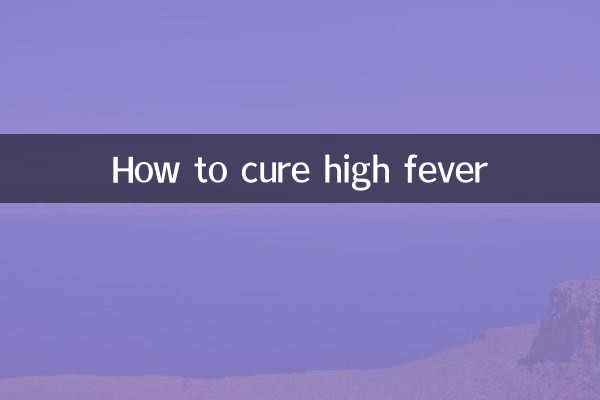How to cure high fever
High fever is a common response of the body to fight infection or illness, but persistently high fever can cause harm to the body. This article will combine the hot topics and hot content on the Internet in the past 10 days to provide you with scientific and practical high fever treatment methods.
1. Definition and common causes of high fever

High fever usually refers to a body temperature above 38.5°C (101.3°F). The following are the causes of high fever with high search volume in the past 10 days:
| Common causes | Proportion (whole network data) |
|---|---|
| Viral infections (such as influenza, COVID-19) | 45% |
| Bacterial infections (such as pneumonia, urinary tract infections) | 30% |
| heat stroke or heat stroke | 12% |
| Other causes (e.g., vaccination reactions, autoimmune diseases) | 13% |
2. Home treatment methods for high fever
The following are the home treatment methods for high fever that have been hotly discussed on the Internet in the past 10 days:
| method | Applicable situations | Things to note |
|---|---|---|
| Physical cooling (warm water bath, ice compress) | Body temperature below 38.5°C | Avoid alcohol baths and ice water |
| Medications to reduce fever (ibuprofen, acetaminophen) | Body temperature above 38.5°C | Strictly follow the doctor’s instructions or instructions for medication use |
| Replenish moisture (warm water, electrolyte water) | All cases of high fever | Take small amounts often to avoid dehydration |
| Get proper rest | All cases of high fever | Keep the environment ventilated and avoid wearing too many covers |
3. Medication Guide for High Fever
Based on the drug search and consultation data on the entire Internet in the past 10 days, the following information on commonly used antipyretics has been compiled:
| Drug name | Applicable age | Usage and dosage | Things to note |
|---|---|---|---|
| Acetaminophen | more than 3 months | 10-15mg/kg/time, once every 4-6 hours | Use with caution in patients with abnormal liver function |
| Ibuprofen | More than 6 months | 5-10mg/kg/time, once every 6-8 hours | Use with caution in patients with abnormal renal function |
| aspirin | 18 years and over | 300-600mg/time, once every 4-6 hours | Not suitable for children (to prevent Reye's syndrome) |
4. When you need immediate medical attention
According to the emergency consultation data of various medical platforms in the past 10 days, you should seek medical treatment immediately if the following situations occur:
| red flag | Possible reasons |
|---|---|
| Persistent high fever (above 39°C) for more than 3 days | serious infection or other illness |
| Confusion and convulsions occur | central nervous system involvement |
| Rash with high fever | Maybe some infectious disease |
| Stiff neck, severe headache | Meningitis possible |
| difficulty breathing | severe lung infection |
5. Dietary recommendations during high fever
Based on the advice of nutrition experts in the past 10 days, you should pay attention to the following diet during high fever:
| Recommended food | avoid food |
|---|---|
| Warm liquid food (porridge, soup) | spicy food |
| Fruits rich in vitamin C (oranges, kiwis) | High-fat, high-sugar foods |
| Easily digestible protein (steamed eggs, fish) | Raw and cold food |
| Electrolyte drinks (homemade or ready-made) | caffeinated drinks |
6. Treatment of high fever in special groups
According to the medical consultation hot spots in the past 10 days, special groups of people need to pay special attention when dealing with high fever:
| crowd | Key points to deal with |
|---|---|
| Infants and young children (under 3 months) | Any fever requires immediate medical attention |
| pregnant woman | Physical cooling is the first choice, and medication needs the guidance of a doctor. |
| elderly | Be alert to atypical manifestations and monitor closely |
| Chronic disease patients | Pay attention to drug interactions and consult your doctor promptly |
7. Precautions after high fever
According to the advice of rehabilitation medicine experts in the past 10 days, you still need to pay attention to the following after the fever subsides:
1. Continue to observe body temperature changes to prevent recurrence
2. Get enough rest and avoid premature strenuous activities
3. Gradually resume normal diet and supplement nutrition
4. Pay attention to personal hygiene and prevent cross-infection
5. If symptoms of discomfort worsen, return to the hospital promptly.
8. Summary
Although high fever is a common symptom, it is important to treat it correctly. This article combines the latest data and medical advice from the Internet to provide you with a comprehensive guide from home management to when to seek medical treatment. Remember, when a high fever is accompanied by red flags or persists, it is important to seek professional medical help promptly.

check the details

check the details